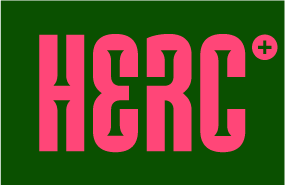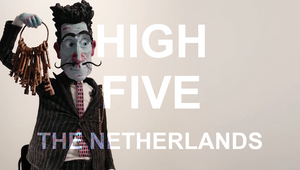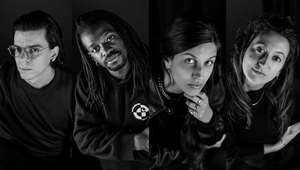
Bossing It: Accepting Vulnerability and Insecurity with Margriet de Kroon

Margriet De Kroon was recently appointed as managing director at Dutch agency HERC, where she sits on the management team alongside HERC founders Emilio de Haan and Rogier de Bruin. She brings a wealth of knowledge in marketing and business development. Her explosive tenure at Young Capital as marketing director Margriet grow her department from eight to 80 full time employees and take the business’ turnover from 100 million to over half a billion in five years. At 30, she became the youngest member of YoungCapital’s management team. As a client of HERC, she has an established relationship with the agency and will oversee HERC’s expansion, recruitment and culture.
What was your first experience of leadership?
The first time I was officially called a leader was when I was 23. I was working for a start-up with a bunch of other people my age and was asked to step into a more managerial role. Initially, I felt incredibly insecure - I was the same age or younger than many of my colleagues - and it took me a while to feel comfortable. But there was no senior figure above us and so it became a great opportunity to learn and grow.
How did you figure out what kind of leader you wanted to be – or what kind of leader you didn’t want to be?
I always try to be myself and be the kind of manager that I would like to have. Early on in my career, I tended to ignore the managerial title and just go with the flow, work alongside my team and not be cut off from them. We had a great time building a company but then the global financial crisis hit and we had to let a lot of people go. That was very traumatic but I remember a former colleague sent me a postcard after she had left and thanked me for the time we had together. She mentioned that she had loved working at the company because she appreciated my style of leadership and loved the culture we had created. For me, that was the moment that I released what a huge impact you can have when you put people first. By spending time with colleagues and making their needs a priority, you can retain a positive experience, even during difficult times.
I now make it a priority to ensure people feel safe and welcome - it’s simple and makes such an impact. You can provide an environment where people thrive.
What experience or moment gave you your biggest lesson in leadership?
I used to be very insecure. I have always been the youngest person in the room and most of the time, the only female. I also took the wellbeing of my team very personally, which matters a lot to me but can also create an additional layer of stress. As I was moving up the career ladder and meeting more leaders, with more experience, I realised that everyone has their own insecurities. I also noticed that the best leaders are willing to ask for help - they understand they aren’t “all-knowing” and that mistakes are part of the job. That was a real light bulb moment for me, helping me to feel more secure and take my career to the next level.
Did you know you always wanted to take on a leadership role? If so how did you work towards it and if not, when did you start realising that you had it in you?
For me leadership was never a goal. It just kind of happened. I can be quite shy and introverted so it was a surprise to me when I started moving in this direction. But, I’m a great believer in a diversity of personality types at every level and by learning through doing. It’s something I try to foster and nurture now as MD of HERC.
When it comes to 'leadership' as a skill, how much do you think is a natural part of personality, how much can be taught and learned?
A lot of it is down to personality, that makes it easier at least. But I do believe that you can learn almost anything you put your mind to. To become a strong leader, in my opinion, you have to be empathetic and able to set aside your ego. You also have to be able to manage a lot of different things at one time and keep cool, which can be difficult. Being open and honest about your experiences and asking for help when you need it is vital.
What are the aspects of leadership that you find most personally challenging? And how do you work through them?
Working with people who have a different work ethic can be challenging. I sometimes struggle to understand people who are just out to make money, who aren’t really involved in a company or it’s culture. That’s so different from how I approach things. My work is a big part of my identity but I always try to walk in the shoes of others and acknowledge that people are different and have different approaches. I think that’s something we all need to be better at - just because it’s different, doesn’t mean it's wrong.
Leadership can also feel a bit lonely. I work very hard to make connections with my team, but a divide can be unavoidable because of the position you are in. You have to work at that. Here at HERC, we have a relatively small team so we all feel very connected, which is great. Part of my role is maintaining that connectivity and collaborative spirit as we grow. I’m excited by that challenge because for us, it’s such an important part of creating a successful business.
Have you ever felt like you've failed whilst in charge? How did you address the issue and what did you learn from it?
I definitely felt like I was failing at the beginning of the pandemic. I was still in my previous role and we were all working from home, all cut off from one another. It was challenging to see the team isolated and insecure. As a management team, we were busy finding ways to navigate the business out of the crisis and so I felt I didn't have enough time for my own team. I also found it incredibly difficult not seeing them every day - you can tell a lot about how another person is feeling by seeing an expression on their face or having an unscheduled chitchat. I missed that a lot - it made me feel very out of touch. I quickly learned to pick up the phone a lot more and to not beat myself up. That doesn’t help anybody. It was a global crisis, we were all feeling the effects, and so being as gentle with myself as I was with my team was vital.
In terms of leadership and openness, what’s your approach there? Do you think it’s important to be as transparent as possible in the service of being authentic? Or is there a value in being careful and considered?
I’m a big fan of being open and transparent with my team. It’s so important that people hear how the work they are doing is helping the company progress and meet its goals. I also want people to be open and honest with me and share their ideas and their concerns. I believe that’s the best way for a company to progress. Having said that, you also have to balance this with being considerate of other people's feelings. Sometimes, too much information can be overwhelming and might prompt people to worry about things they don’t need to worry about. That’s my job! So, I would rather keep some things back to allow others to focus on what they do best.
As you developed your leadership skills did you have a mentor, if so who were/are they and what have you learned? And on the flip side, do you mentor any aspiring leaders and how do you approach that relationship?
I’ve never had an official mentor. I’m very grateful that I have always worked for companies that have hired amazing people I could turn to for help and guidance. I learnt a lot from two ‘Power Ladies’ who sat on the board of YoungCapital who taught me when to step in and when to step back, something I found really useful. Right now, I am learning a lot from the HERC founders. As creatives, their approach to business is incredibly inspiring - they’re always finding ways to push brands further, help them stand out and break conventions. It’s radical and refreshing. In terms of mentoring, since arriving at HERC, that’s been a big part of my role. I’m here to help mentor and guide the wider team and it’s something I love to do.
It's been a really challenging year - and that's an understatement. How do you cope with the responsibility of leading a team through such difficult waters?
You have to have compassion for yourself. You have to treat yourself kindly. Sometimes it helps to step back from a situation and look at the bigger picture. It’s easy to take things personally, but sadly, you can’t. All you can do is ensure you have done everything in your power to get the best outcome and remember some things are out of your control.
This year has seen the industry confronted with its lack of action/progress on diversity and inclusion. As a leader how have you dealt with this?
Initially, I felt powerless because this is such a huge global issue but I did what I always do when something feels bigger than me. I looked at where my circle of influence reaches and how I can use that. I wrote an article on Linkedin that started conversations and hopefully had an impact on the way some people thought. I also put this topic high on the agenda of every meeting I had - I wanted to listen to everybody and take on their ideas for creating a culture that was welcoming and inclusive. One of the things I am most proud of from my time at YoungCapital was the initiatives we created to progress diversity. Now, I’m here at HERC and diversity is the backbone of the company - both internally and in the work we produce. I’m very proud to lead this agency, we’re really committed to making the industry more diverse.
How important is your company culture to the success of your business? And how have you managed to keep it alive with staff working remotely in 2020?
This is the most important thing for me and my number one priority. I believe that the only way you can be truly successful (and for me success is not just being profitable) is to create a company culture where people can really thrive, feel safe and progress - it makes going the extra mile worth it. Working remotely has made this more difficult, but if you give people space to develop themselves, you let them make mistakes and you are there for your team as a leader (albeit remotely), you can still build a culture.
What are the most useful resources you’ve found to help you along your leadership journey?
Having read a fair few in my time, I no longer believe there’s benefits in reading leadership books. For me, the most useful thing to do is to talk to and observe others and ask for feedback from a wide range of sources. Most importantly, just do it - see what works and what doesn’t!










